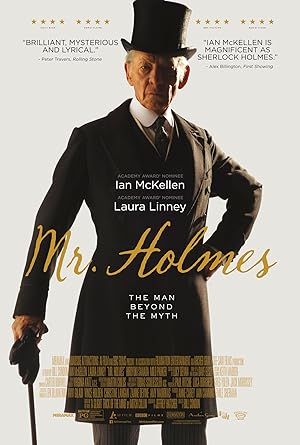I almost watched Mr. Holmes in the theater because of Ian McKellen, Ian McKellan and Ian McKellan. Did I mention Ian McKellan? I’m glad that I didn’t. Mr. Holmes violates a rule that I believe all movies should not violate. If a film is going to shift between multiple storylines that take place at different times, but develop a unified theme, the majority of those storylines should be interesting and worthy of a solo movie. If the majority of those storylines aren’t, then just tell the story in a linear narrative or make one story really great.
Mr. Holmes uses this plot device to mirror the effects that aging has on Mr. Holmes’ sharp mind. Unfortunately the individual stories aren’t that riveting. The present shows Mr. Holmes after he came home from a trip to post WWII Japan as he becomes more dependent on his housekeeper and bonds with her son. There are two sets of flashbacks: the last case that he handled and his trip to Japan. Mr. Holmes grapples with a life of prioritizing facts over feeling and feels nothing but regret, loss and guilt. From the opening scene, I predicted exactly what would happen in the denouement. If you see a gun early in a film, then someone is going to use it.
If you substitute a certain living being for a gun and expect the gradual humanization of a fictionalized person who is actually a fictional person as he grapples with his mortality, Mr. Holmes will hold no surprises for you. Mr. Holmes thinks that it is being clever, but it is actually a predictable film that fails to break any new ground or elicit any great wellspring of feeling. Skip Mr. Holmes unless you are a Sherlock Holmes fanatic or must see every film starring Ian McKellan.
Stay In The Know
Join my mailing list to get updates about recent reviews, upcoming speaking engagements, and film news.





